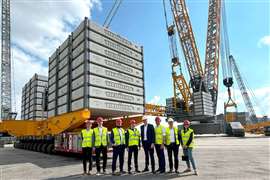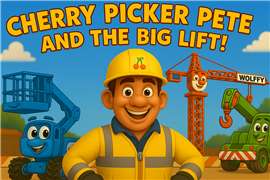Rock solid
20 March 2008

With a feet of 25 horses and an array of buggies, Rudie Wilhelm started his business in 1912 in Portland, OR, hauling baggage from the local rail terminal. Almost a century later Wilhelm Trucking and Rigging is still family owned, with Wilhelm's grandson Bob Wilhelm, Jr. at the helm. The horses have been replaced with a modern fleet of trucks and trailers that haul cargo and oversized, over-dimensional freight throughout the Pacific Northwest.
“My grandfather started the business really prior to the motor truck,” says Wilhelm. “In time they expanded into warehousing and general trucking. But, actually, you could say the business was built on the golf course. Rudie Wilhelm loved golf. He was the Oregon amateur champ seven times. He'd get customers out on the golf course and move them that way.”
Through the years the business expanded to meet demand and, at one time, owned more than 1 million square feet of warehouse space in the Portland area. In the early 1940s, Rudie's son Bob Wilhelm, Sr. started working for the company.
“When Dad came into the business, his interest was specialized transport,” said Wilhelm. “By the late 1930s and early 1940s there was quite a war effort in this region because they built Liberty ships here in Oregon, and there were jobs for welders and boilermakers. Th at was the start of industrial growth in Portland.”
As the business and industry of Portland evolved, Wilhelm Trucking evolved to meet the demand, and the rest “is history,” says Wilhelm.
Today the company runs about 50 to 60 trucks and maintains a fleet of about 150 trailers and employs about 60 people, including Bob's son and his father. “Dad still works in the business,” says Wilhelm. “He was here today. He came in and read the newspaper. He's sure fun to have around here. He started lubing trucks at 12 years old and he's still coming to work.”
With hopes to pass the business to the fourth generation, Wilhelm says his son is working for the company as a rigger and a driver, learning the business from the ground up.
I recently had the opportunity to interview Bob Wilhelm, Jr. to get his take on the business of specialized transport and the challenges that must be met to keep a century old business thriving.
How has your family has managed to keep the business going for almost 100 years?
I think that all of our family is very conservative and we pay attention to the business and we don't lose sight of our goals. The fact is we don't have yachts and planes. It's an interest in the business and keeping it solid from a financial stand point, those are the main things.
It is hard to keep a family business a family business. I have one son and one daughter, and I do have a succession plan that may or may not happen. We are financially starting to go through things that will allow it to happen. But there are events that can change those plans, so I have a contingency plan in mind also.
How does Wilhelm distinguish itself in the market? What percentage of your business is specialized heavy haul?
That's a difficult question. Wilhelm has been the genesis of practically every other heavy haul and rigging company in the Portland area. We are basically competing against many of our ex-employees.
I think what distinguishes us is that we do everything. We do the trucking, the rigging, the crane service. The other companies identify one of those things and that's not to say they don't do it well, but we can do everything and do it well. Th at and our reputation as an ethical, honest company. Th at is invaluable in this area.
It varies, but right now we are probably doing 65% heavy hauling and 35% rigging.
What are the biggest challenges in running the business today and how do you address them?
You come to work and there's a challenge. Basically I see three things: Number one is that to keep the business open you've got to have good personnel and therein is a real dilemma because finding them is impossible and stealing them from other companies is not something we do. You basically have to bring them on, train them and hope they will turn out to be a nugget in the end. You have to be able to spot them in the raw.
Next, the regulatory climate in Oregon and the Washington area is another big challenge. They are continually restricting our ability to do some of the things we do best and that is basically a permitting issue. We've tried very hard through state associations, SC&RA and other methods to urge the cooperation of the state and done a good job, but there are still those people who can't see the forest for the trees.
Another challenge we are facing is the administration of the businesses. Health insurance is a huge issue today, and I can't tell you where it's going to end. It's a real dilemma for management. You feel very close to people but there's a limit to how much you can do. What it's doing is creating an unbalanced playing field where competitors may not be doing as much or are doing more, gaining an advantage or disadvantage. There's not a level playing field as far as benefits and what you can offer. This is a big challenge.
What are the challenges dealing with permitting and logistics for heavy hauling in all the different states and governmental entities in which you operate?
We operate basically in the Northwest: Oregon, Washington, Montana, California, and Idaho. We will go to Canada if necessary.
But mainly it's Oregon and Washington.
[Regarding regulatory problems] there's not a big difference in Washington and Oregon. Both are a challenge. We've been able to get them together in terms of where the limits are going to be drawn. I must say that both are very cooperative and try very hard to say “yes.”
One thing that has been a positive in Oregon is the MCTAC meetings. It's a meeting of the administrators of the ODOT Motor Carrier Transportation Advisory Council. It's time that you just let the fur fly and, hopefully, it irons out some issues. It has been very effective in Oregon and it has started in Washington where I anticipate likewise it will be good. We are all able to talk on a layman level. You can say: This is a problem and how can we solve it? It's amazing how much we get done at these meetings. It's not senior staff from the WDOT or ODOT. It's the middle level managers and people on the ground running. They tend to be the ones to see the problems and tend to know what the answers should be. It's a monthly dialogue and it's very positive.
Mostly, it's always about weight and the restrictions. Oregon is going through a $6 billion dollar bridge replacement program and they have formed a committee that does nothing but study the delays that these potential projects will cause, and figure out how to avoid them. Th at has been an interesting project. It was modeled after a project in Virginia, apparently. I can't remember how many structures are involved in Oregon; it is massive bridge building, on IH5, IH84, US 97 and US 26. They are coordinating the bridge work on all three of those so that bridges aren't closed at the same time. They are doing a heck of a job of tracking this project. The closures and weight restrictions are the key to the majority of problems.
What are your most memorable specialized transport projects?
You talk about single items, well I like to think that a successful project is one of many loads be they specialized or not that are completed without incident.
Oregon is really a strong proponent of green energy and there are windmills going up every where. I like to look at those. We recently delivered 1,400 loads [of wind tower components] without incident and 95% were permit loads - 140 foot windmill blades on 90 foot stretch trailers and with a tail swing of 40 feet. Those are pretty impressive deliveries, 300 of those delivered without a scratch. I look at those as successful and memorable projects.
But there are many other successful projects. What seems routine to us may be exciting to someone else. Other transformers and turbines and things like that. Bridge beams are also interesting deliveries, sometimes challenging one's ingenuity. We're heavy into the pre-stressed concrete business.
What is the most impressive piece of equipment or vehicle in your fleet (i.e. trailer, dolly, truck, etc)?
The way I answer that is of what we're capable of doing, one of the things we've done is concentrate on stretch equipment. We have an array of stretch double drops, single drops and flatbeds, and those are unique pieces of equipment out here. They add a lot of flexibility to what we can do. We're just now taking delivery of new steering trailer combinations - four axle steer trailers and two complete units. And they will be very useful and will allow us to go up to 160,000 pound bridge beams, the next generation of bridge beams. Th at may not be big for Florida maybe but we are just getting there out here. And we still have our 300 ton capacity low bed that continually stays busy. It's 30 years old but still in good shape.
How do you hire and retain drivers?
I think a company's reputation has a lot to do with who comes walking through the door. When they know you are going to check their backgrounds and hire on the basis of their background, that eliminates a lot of people who are going to walk through the door. The problem is getting the right guys to walk through the door. In our market, satisfied drivers you have working for you are your best reference, your best salesmen. They spot a good driver and tell them about our company. We get a lot of driver referrals in that respect. We also just do the traditional running ads and other internet-based resources. We've been very fortunate. We have been short a few times but generally we are at the employment level we want. We're not a huge company; 40 or 50 drivers fills us up.
How is the LandStar System incorporated into Wilhelm Trucking and Rigging?
Basically, we are a Landstar agent and this complements our business. Wilhelm does not go nationwide, but Landstar is nationwide. We have the ability to offer nationwide services to any of our customers. In addition, we can solicit freight outside our area. We have six people who are dedicated to Landstar and that's all they do. The deal is with Landstar is if we get a haul that we can't handle, Landstar can handle it. If Landstar gets a deal that's more a Wilhelm deal, we will handle it. Landstar has very unique business model that is just absolutely incredibly efficient. It's been successful for us from day one. And it continues to be, as long as you understand how it works, it's fabulous.
When you are not at work how do you spend your time?
I enjoy golfing. I'm not the golfer my grandfather was but I enjoy it. I love to travel too. I just got back from the Far East.
STAY CONNECTED


Receive the information you need when you need it through our world-leading magazines, newsletters and daily briefings.
CONNECT WITH THE TEAM











